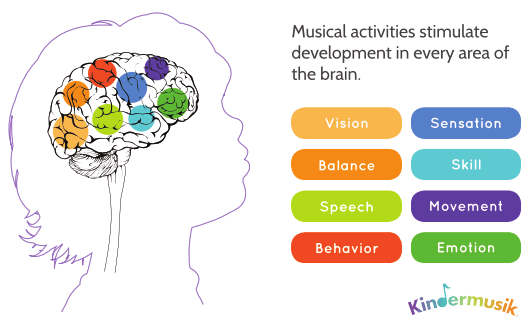 Music changes us. Of course, we know that music can move us to tears, conjure up (and make) memories, or even quiet a child’s cries. However, music also literally changes our brains!
Music changes us. Of course, we know that music can move us to tears, conjure up (and make) memories, or even quiet a child’s cries. However, music also literally changes our brains!
A new presentation from neuroscientist Nina Kraus at the American Psychological Association’s 122nd Annual Convention displays some of the strongest research to-date proving how music changes the brains of children who are most at risk.
The Science Behind Music’s Impact on Learning
At the convention, Kraus shared her research findings that indicate learning to play a musical instrument or to sing can help disadvantaged children strengthen their reading and language skills by improving the way their nervous systems process sounds in a busy environment, such as a classroom. The boost to the neural function can lead to improved memory and longer attention spans, which help children focus better in school and improve communication skills.
“Research has shown that there are differences in the brains of children raised in impoverished environments that affect their ability to learn,” Kraus explained in a press release about her research study, Biological, Behavioral, and Academic Impact of Musical Training in At-Risk Children. “While more affluent students do better in school than children from lower income backgrounds, we are finding that musical training can alter the nervous system to create a better learner and help offset this academic gap.”
See, music changes our brains!
Kraus’ partner at The Harmony Project is Margaret Martin, DrPH, MPH. She started The Harmony Project in 2001 to serve children of poverty in areas with school dropout rates above 50 percent. To help prove that music improves language and literacy abilities of children, she enlisted the help of Kraus. And, what a great partnership for all music educators!
“Early sustained music learning is actually the frame upon which education itself can be built for low income kids,” Martin explained in this PBSNewsHour segment:
[youtube]https://www.youtube.com/watch?v=AZHg8dr6gf0#t=18[/youtube]
Musical training in early childhood
In Kindermusik early childhood classes for children from newborn through age 7, we intentionally use music as the vehicle for learning. So naturally, we get excited when research proves that musical activities really do have a positive impact on the way children learn.
Kindermusik supports all areas of development including—musical, language, emotional, physical, social, and cognitive development. When children actively participate in musical experiences, they engage their whole brain in the process. Here are just four areas and examples of how Kindermusik programs use music (and movement) to support a young child’s development:
- Communication Skills: When we recite a rhyme about shaking an apple tree then shake our bodies in the same way or sing “Head, Shoulders, Knees & Toes” and move our bodies to touch our heads, shoulders, etc., children develop a vocabulary and understanding of these concepts, even in infancy…by seeing, hearing, and doing.
- Listening Skills: By focusing intently on one sound, such as the beat of a drum,

Kindermusik class in Zimbabwe teaches children through music.
children practice the skills of attention and engaged listening. Encouraging children to imitate the sound and discussing the sound increases comprehension and learning. - Memory: Young children move to learn and learn to move. We specifically include lots of movement in our classes, which stimulates the release of chemicals in children’s brains that support memory and learning. So, when we dance a jig or hop like a frog children get the wiggles out….and keep the learning in!
- Comprehension: Engaging in language and literacy-rich musical activities that incorporate movement such as tapping the steady beat to a nursery rhyme correspond to greater comprehension.

